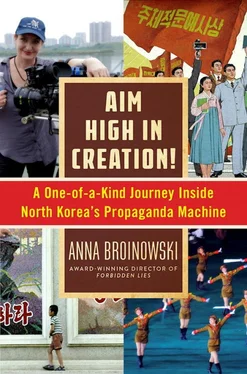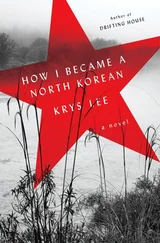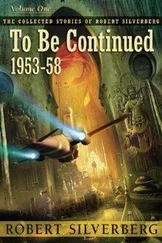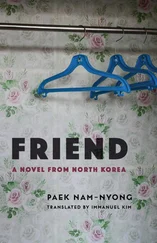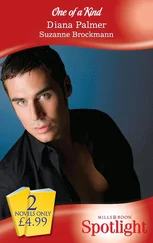Nick smiles, and beckons a waitress comrade over to order tea. Lizzette looks uncomfortable but says nothing. She must be as hungry for answers as I am. The comrade walks off, and Nick turns back to us, totally relaxed: “I get asked those questions by everyone I take in. I know it’s hard to understand, but the girls on Air Koryo are innocent. They are proud to be the first North Koreans most foreigners meet. They want to make a good impression, and they’re peachy-keen to practise their English. That hostess wanted to be your friend, Anna. As for the pipes, that’s ‘the nine o’clock haze.’ It’s steam from the thermal power plant that heats up the city. It’s harmless. Mr. Ri told the Soviet joke because it always gets a laugh. It’s been perfectly acceptable to criticise the Russians ever since they stopped giving aid. That doesn’t mean Ri is a subversive, and neither is Pak. They meant everything they said. Pak speaks Japanese because he is old enough to have lived under the occupation, when everyone was forced to speak it. He’s also made a few movies in Japan, through a North Korean friendship group called Chongryon. Like anything else here, provided you do it in the right context, speaking Japanese won’t get you shot.”
Nick waits for me to take all this in. My head’s spinning a million times faster than our table, as I try to match his rational explanations to my paranoid thoughts. They just don’t fit. “What about the rabbits, then?” I ask, stubbornly. “And the labour camps? I mean, not every bad thing we’ve been told about this country is a lie, even if we haven’t seen any evidence of it. The UN has figures to prove it! Thirty-three percent of people in North Korea don’t have enough to eat! And those poor little kids, under the overpass…”
“Shhhhh,” says Lizzette, looking around the deserted restaurant. “We can speak about this in Beijing.” She’s right. The restaurant is probably wired to Floor Five.
Or is it?
I can feel my bearings slide from under me, as Nick looks at me with concern: “Ms. K was hurt you didn’t believe her about the rabbits. People do eat them; they gather grass all over the city to feed them. And those kids do love practising for the mass games. This is a poor country, sure. There is starvation, but not at the levels of the ’90s famine. In Pyongyang at least, people lead normal lives. They may not have air-conditioned gymnasiums, but they pride themselves on their ability to use every inch of space. You’ve seen the vegetable plots people grow beside the roads. It’s the same with the mass games. It’s normal to practise under an overpass; the gymnasts I filmed practised backflips on the concrete. North Koreans are raised to be resilient. If you come back in September, when the games are on, you’ll see for yourself.”
Lizzette nods, on Nick’s side: “The main thing is, don’t alienate Ms. K. You’ve already won over Mr. Pak. Don’t push it.”
But I’m not giving in, yet. My fever is raging, and I’m in a belligerent mood. I’m the Commander of the Creative Group, aren’t I? Why should I have to obey these tycoon Western producers? Kim would approve. If Ms. K is listening in from Floor Five, so be it. I fix Nick with a sweaty gaze, and raise my voice: “What about the traffic lady? The one who was executed for sneezing on the job? And what kind of factory produces ‘steam’ in the middle of a city, for God’s sakes? Exactly what aren’t we being shown? How evil is this place, really, between the horror stories on Fox and the saccharine barrage they’ve fed us since we got here?”
Lizzette lets out an exasperated groan. Nick doesn’t answer. The comrade is back with his tea. She lays the cups on the table with swift, deft movements, frowning with concentration. “Oi,” says Nick, teasing her, “I know what you’re thinking: That tongji Nick, always making me work. When will he stop ordering more bloody English tea!”
It has the desired effect: the waitress gives him a glorious smile, utterly charmed. Then she turns to me, painfully shy: “Madam, would you care for an alcohol-based beverage?”
“Wow, you’ve been studying!” says Nick, and the girl nods, delighted. She’s guileless, just like the hostess on Air Koryo. I feel awful for having been so rude. I run to the loo and lock myself inside the cubicle, trying to still my raging brain. I’ve been looking at this place through First World glasses, I tell myself: of course they can’t afford gymnasiums. I have a flash of the local school I attended as a child in Manila—we held assemblies in the dirt, made toys out of rubber bands and did athletics in the car park next to a stinking canal. And we were happy. If you ignore the Kims and look at this country as a Third World economy, the lives its people lead start to make sense. Perhaps you really can take the North Koreans at face value, I decide. Perhaps, unlike Westerners who have the luxury of cynicism, able to find the catch in every transaction, North Koreans really do believe what they say. Their propaganda has certainly taught them to believe it, just as democracy has taught us to look for the lies.
I return to the table, shaky but purged. I smile politely at Nick’s waitress. “Can I please have a bourbon and Coke?”
She shakes her head, affronted: “No. We do not have Coke in our country.”
And there’s the disconnect again: in the basement of this very building is a tropical bar, with hookers, iPhones, and Coca-Cola on tap. Does this girl know about it, or not? Or in the world she has been trained to inhabit, is it possible for Coke to exist in one place, and not in another? I order water, and she walks away. “She’s sweet,” I say to Nick, trying to be conciliatory.
He nods: “Most of them are.”
We watch the sun set over the city in silence, and I shelve my other questions until we get out. The buildings slowly slide into blackness. The only thing still visible down there is Kim Jong Il’s face on the Grand People’s Study House, glowing greenly in the void.
“Look, this is a nasty place,” says Nick, softly. “That’s undeniable. But most people out there are like you and me. They love their kids and just want to get through the day.”
WHEN WE GET BACK to the forty-seventh floor, Ms. K is waiting. She gives me an old DVD player and a stack of discs. She has scrawled the titles in black text: they are Mr. Pak’s and Mr. Ri’s latest movies, plus some classics starring Yurim and Ms. Yun. At least five have been made in the last three years. I thank Ms. K profusely. This is pay dirt: I have in my hands twenty-two films that no one, not even Johannes and his underground cinema friends, has seen outside North Korea.
Lizzette and I shower and throw on the Yangakkdo’s thin terry-towelling robes. I dose up on Imodium and hook the DVD player to my boxy TV. We climb into the narrow beds for a slumber party, Pyongyang style: no room service, no bar fridge, and no sleep. Ms. K has not said if we can take the films with us when we leave, which means that if we want to know what North Korean filmmakers have been doing for the last decade, we have to watch everything at Chollima speed—tonight.
I slide in the first disc, a 2009 movie by Mr. Ri called Two Families of Hangdong . I’ve pegged the tough-looking Ri, with his crumpled combat gear and permanent fag, as an action man. But I’m wrong. Two Families is a witty satire about married life: the North Korean Husbands and Wives . It follows two women living in the same Pyongyang apartment block. One has a successful husband, happy kids, and a sparkling flat. The other is a poor but beautiful singer, struggling to raise her son in the absence of her deadbeat husband. When he does come home, they fight—and the whole apartment block joins in, advising them how to fix their marriage in group-criticism sessions run by the block’s bossy chairwoman.
Читать дальше
